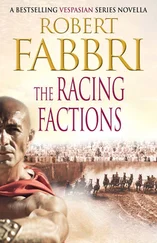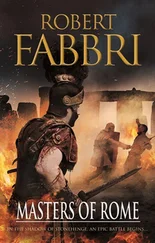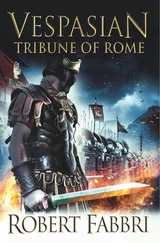Robert Fabbri - False God of Rome
Здесь есть возможность читать онлайн «Robert Fabbri - False God of Rome» весь текст электронной книги совершенно бесплатно (целиком полную версию без сокращений). В некоторых случаях можно слушать аудио, скачать через торрент в формате fb2 и присутствует краткое содержание. Жанр: Исторические приключения, на английском языке. Описание произведения, (предисловие) а так же отзывы посетителей доступны на портале библиотеки ЛибКат.
- Название:False God of Rome
- Автор:
- Жанр:
- Год:неизвестен
- ISBN:нет данных
- Рейтинг книги:3 / 5. Голосов: 1
-
Избранное:Добавить в избранное
- Отзывы:
-
Ваша оценка:
- 60
- 1
- 2
- 3
- 4
- 5
False God of Rome: краткое содержание, описание и аннотация
Предлагаем к чтению аннотацию, описание, краткое содержание или предисловие (зависит от того, что написал сам автор книги «False God of Rome»). Если вы не нашли необходимую информацию о книге — напишите в комментариях, мы постараемся отыскать её.
False God of Rome — читать онлайн бесплатно полную книгу (весь текст) целиком
Ниже представлен текст книги, разбитый по страницам. Система сохранения места последней прочитанной страницы, позволяет с удобством читать онлайн бесплатно книгу «False God of Rome», без необходимости каждый раз заново искать на чём Вы остановились. Поставьте закладку, и сможете в любой момент перейти на страницу, на которой закончили чтение.
Интервал:
Закладка:
The street opened out into the busy main agora of the lower city.
‘What’s going on there?’ Magnus pointed at a large crowd of mainly Jewish men jeering at a tall, broad-shouldered young man standing on a plinth attempting to address them. Next to him stood a young woman carrying a one-year-old girl-child; a three-year-old boy squatted at her feet looking fearfully at the crowd.
‘Another Jewish proselytiser, I expect,’ Vespasian replied with a sigh. ‘There seems to have been an influx of them recently, preaching some new sort of Jewish cult. I’m told that the elders don’t like it, but as long as they don’t cause any trouble I leave them alone. The one thing that I’ve learnt here is that it’s best to keep out of Jewish affairs, they’re impossible to understand.’
Unimpeded now by beggars, the litter-bearers made good progress along the lower city’s wide main thoroughfare, lined with the old and tatty, but still imposing, two-storey houses of the richer merchants, and they soon started the short ascent to the upper city.
Heartened somewhat by the prospect of reading Caenis’ letter, Vespasian turned his thoughts to his lover whom he had not seen for over seven months. Still a slave in the Lady Antonia’s household, she would be thirty in three years’ time and he lived in hope of her being freed upon attaining that age, the youngest allowed by law for the manumission of slaves. Although it was against the law for a man of senatorial rank to marry a freedwoman, he hoped to take her as his mistress as soon as she was able to make decisions in her own right. He planned to set her up in a small house in Rome with the money that he was quite quickly accruing from the bribes and gifts that naturally came his way from provincials anxious to have the favour of the highest ranking Roman official in the area. Now that he had put his scruples to one side and was taking the bribes he hoped that by the time he got back to Rome he would have enough not only for a house for Caenis but also for himself and the wife he must soon take to fulfil his duties to his family. A series of letters from his parents, now living in Aventicum, in Germania Superior, where his father had purchased a banking business, had impressed upon him the need to produce an heir for the security of the family.
They soon reached the street of King Battus in the upper city; at its eastern end was the Roman Forum, beyond which stood the Governor’s Residence — a much more modern building that had been purpose-built by the Romans one hundred years previously after Cyrenaica had become a Roman province.
Vespasian’s litter was set down in front of the Residence and, brushing off his bearers’ attempts to help him, Vespasian stepped down, adjusted his toga and mounted the steps.
Magnus followed, grimacing at the quality of the four auxiliary guards beneath the portico as they brought themselves haphazardly to attention. ‘I see what you mean,’ he commented as they passed through the doors and into a large atrium with clerical staff working at desks down one side, ‘they’re a fucking shambles; not even their mothers could be proud of them.’
‘And they’re among the best from the first century,’ Vespasian replied. ‘There’re a couple of centuries who can’t even dress themselves off into a straight line; the centurions are getting through vine-sticks at an incredible rate.’
Before Magnus could express his opinions on the effectiveness or otherwise of beating discipline into sub-standard soldiery, a well-groomed, togate quaestor’s clerk approached them.
‘What is it, Quintillius?’ Vespasian asked.
‘There’s been a woman waiting to see you for three hours now; I tried to get her to make an appointment to come back at a more suitable time but she refused. She said that as a Roman citizen it’s her right to see you as soon as you return. And also that it’s your duty to see her as her father was your uncle’s clerk when he was a quaestor in Africa.’
Vespasian sighed. ‘Very well, have her shown to my study. What’s her name?’
‘That’s the odd thing, quaestor, she claims to be a kinswoman of yours; her name’s Flavia Domitilla.’
‘And it’s now a month and a half since he went southeast and he promised me that he wouldn’t be gone more than forty days.’ Flavia Domitilla sobbed into a silk handkerchief, then dabbed her eyes carefully so as not to smudge the thick line of kohl that outlined them.
Whether she was genuinely upset or just using her feminine wiles to the full, Vespasian could not tell, nor did he very much care; he was transfixed by this elegant and immaculately presented young woman. Tall with curved hips, a thin waist and high, rounded breasts, her body was sumptuous. Her intelligent, sparkling, dark eyes, a slender nose and a full mouth were framed by a mound of high-piled black hair with braids falling to her shoulders on either side. Apart from a few slave girls he had not had a proper woman since he last saw Caenis; and Flavia Domitilla was undoubtedly a proper woman. Her clothes and jewellery spoke of wealth and her coiffure and make-up told of the time that she had to enjoy it; she was exquisite. Vespasian stared at her, inhaling her feminine scent, heightened by the heat and augmented by a delicate perfume, as she whimpered softly into her handkerchief. He felt the blood pulsing in his groin and, to cover any embarrassment, adjusted the folds of his toga, grateful, for the first time since arriving in the province, to be wearing the garment. In an effort to tear his mind away from carnal thoughts, he raised his eyes to study her features. Other than a slight roundness of the face he could make out nothing that would suggest a close kinship; however, her name was irrefutably the feminine form of Flavius.
Suddenly realising that he had been too busy admiring her to take in what she had been saying, he cleared his throat. ‘What was his name?’
Flavia looked up from her handkerchief. ‘I told you; Statilius Capella.’
‘Oh yes, of course; and he’s your husband?’
‘No, I’m his mistress; haven’t you listened to anything?’ Flavia frowned. ‘His wife is back in Sabratha in the province of Africa; he never takes her on his business trips, he finds that my charms work much better on his clients.’
Vespasian could well believe it; they had certainly worked on him and, dizzy with desire inflamed by her sensual scent and ripe body, it was as much as he could do to keep his hands clamped on the arms of his chair and concentrate on what she was saying. ‘And what was his business again?’
Flavia looked at him exasperated. ‘You’ve just been sitting there staring at my breasts, haven’t you, because you’ve evidently not heard a word I’ve said.’
Vespasian opened his mouth to deny the accusation — he had been staring at more than just her breasts — but thought better of it. ‘I’m sorry if you think that I’ve been inattentive, I’m a busy man,’ he blustered, his eyes involuntarily resting again for a moment on the magnificent swell of that part of Flavia’s anatomy.
‘Not too busy to sit and stare at a woman’s body rather than listen to what she has to say. He’s a wild-beast master; he procures animals for the circuses in Sabratha and Lepcis Magna. He was making a trip out into the desert to try and get some camels; they don’t put up much of a fight but they look funny and make people laugh. We don’t have them in the province of Africa but there’s a tribe here that does.’
‘The Marmaridae.’
‘Yes, that sounds right, the Marmaridae,’ Flavia agreed, pleased to have his full attention finally.
‘So your er… man has gone to try and buy camels off a tribe that doesn’t acknowledge Rome’s hegemony in the area because we’ve never been able to defeat them in battle as they’re nomadic and almost impossible to find?’
Читать дальшеИнтервал:
Закладка:
Похожие книги на «False God of Rome»
Представляем Вашему вниманию похожие книги на «False God of Rome» списком для выбора. Мы отобрали схожую по названию и смыслу литературу в надежде предоставить читателям больше вариантов отыскать новые, интересные, ещё непрочитанные произведения.
Обсуждение, отзывы о книге «False God of Rome» и просто собственные мнения читателей. Оставьте ваши комментарии, напишите, что Вы думаете о произведении, его смысле или главных героях. Укажите что конкретно понравилось, а что нет, и почему Вы так считаете.












